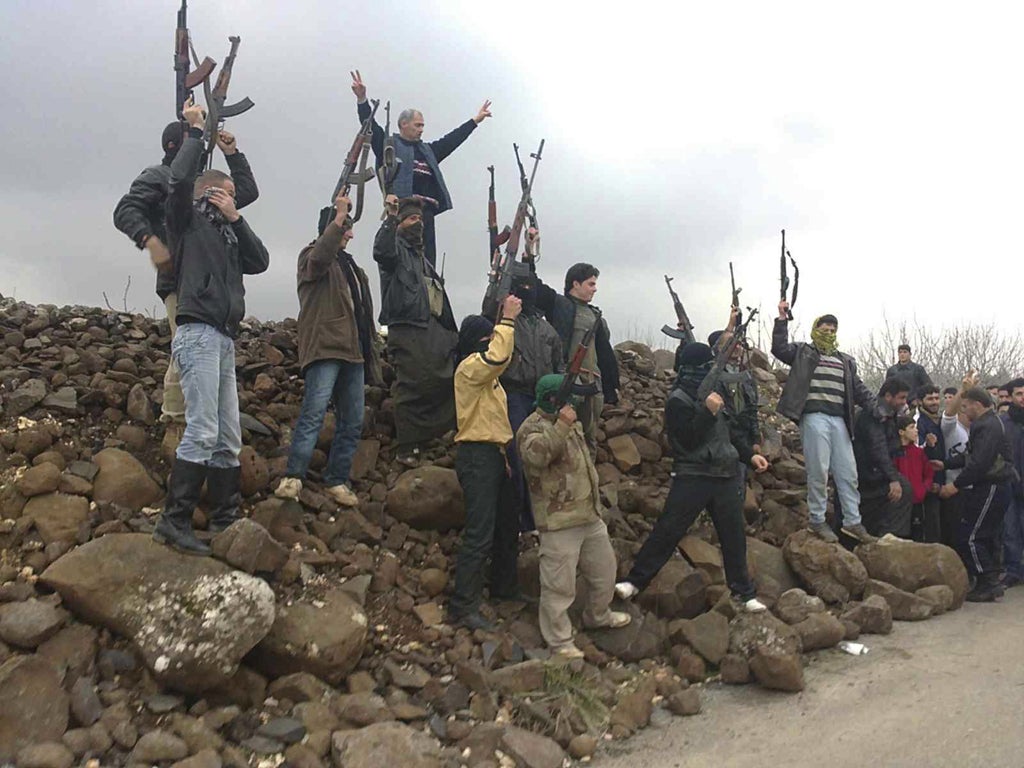Battles rage near Damascus after Arab League suspends mission
Thousands of troops and tanks rushed to Syrian capital's suburbs in fierce crackdown on rebels

The embattled Syrian regime moved thousands of its troops and tanks into suburbs on the edge of Damascus early yesterday in an effort to reclaim outlying districts from rebels, as fierce battles neared the capital for the first time.
The military offensive comes a day after the Arab League said it was suspending its controversial observer mission after its presence failed to stem the bloodshed in a nearly 11-month uprising that the United Nations estimates has cost at least 5,400 lives.
More than 50 tanks and personnel carriers, packed with 2,000 soldiers, rolled into the suburbs at dawn as the Assad regime tried to flush out rebels who have holed up in Sunni areas and set up checkpoints in the past week within striking district of its seat of power. At least 19 people were killed, and scores of residents were captured on video footage fleeing for Damascus as the areas came under heavy fire.
In addition to the assault on the Damascus suburbs of Arbeen, Jisreen, Saqba and Kfar Batna, there were also reports of heavy bombardments in the mountain town of Rankous, 20 miles north of the capital, where more than 30 people have been killed in recent days. Residents say thousands of troops have besieged the town since the middle of last week, trying to rout army defectors.
Activists, who said the death toll across Syria yesterday reached 66, including 26 civilians, claimed the majority of those killed in the fighting around Damascus were non-combatants. "It's urban war," one activist said. "There are bodies in the street."
Dissident fighters, mostly army defectors loosely banded under the banner of the Free Syrian Army, have grown increasingly bold in recent weeks, mounting potent attacks on government forces, and moving ever closer to the capital, which has until now escaped the large-scale protests and violence that has gripped other cities.
The sheer size of the military offensive, which started on Saturday and escalated in the early hours of Sunday morning, reflects President Bashar al-Assad's growing desperation to crush a once-peaceful uprising that now poses a grave threat to his rule. It also comes as diplomatic pressure on him to step aside intensifies, with the UN Security Council in discussions over the wording of a resolution condemning the ongoing violence, potentially paving the way for tougher sanctions.
Activists suggested that Mr Assad was fighting for his survival. "The fighting today is the most intense near the capital since the uprising began," said Rami Abdul-Rahman, who heads the British-based Observatory for Human Rights. "The Syrian regime is trying to finish the uprising militarily now that the case is being taken to the United Nations."
The Security Council, which held closed-door meetings on Friday to debate a draft resolution reflecting Arab League demands for Mr Assad to cede power, is divided. Russia, which wields a veto and has been unflinching in its support of the Syrian regime, is opposed to any resolution that calls for the removal of Mr Assad, and which does not rule out military action, fearing another Libya-style intervention.
Arab League Secretary General Nabil Elaraby and Qatari Prime Minister Hamid bin Jassim set off for New York yesterday to gather support for the League's initiative to end the crisis. Their proposals, which call for Mr Assad to step down and form a unity government, will be presented to the Security Council tomorrow. Syria has already rebuffed the initiative.
Meanwhile, the Arab League is to discuss the fate of its observer mission, accused of providing cover for the regime's abuses, on 5 February. In sharply worded comments on Saturday, Mr Elaraby accused the government of killing "innocent citizens," rejecting the regime's portrayal of those calling for Mr Assad's overthrow as foreign-backed "terrorists".
In suspending the mission, he said that the government had "resorted to escalating the military option in complete violation of [its] commitments" to stop the bloodshed and to withdraw its troops from Syria's urban areas.
Subscribe to Independent Premium to bookmark this article
Want to bookmark your favourite articles and stories to read or reference later? Start your Independent Premium subscription today.

Join our commenting forum
Join thought-provoking conversations, follow other Independent readers and see their replies